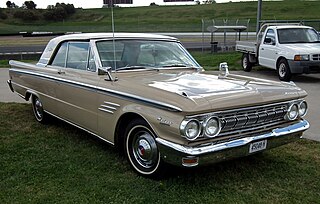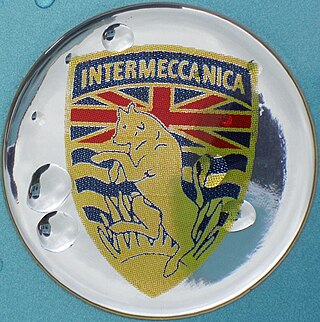
AC Cars, originally incorporated as Auto Carriers Ltd., is a British specialist automobile manufacturer and one of the oldest independent car makers founded in Britain. As a result of bad financial conditions over the years, the company was renamed or liquidated many times until its latest form. In 2022, the new corporate structure began the production of new AC Cobra models, with a slightly modified structure to adapt it to modern safety and technology requirements and obtain the European road homologation certificate.

Reliant Motor Company was a British car manufacturer based in Tamworth, Staffordshire, England. It was founded in 1935 and ended car production in 2002, the company had been known as "Reliant Motor Company" until the 1990s when it became "Reliant Motors" and then finally became "Reliant Cars LTD" after production had ended of the Robin as the company was restructured to be a car import business. It is now a dormant company and the only entity left is a separate parts company created called "Reliant Partsworld" which produces parts for Reliant vehicles.

The Reliant Scimitar name was used for a series of sports car models produced by British car manufacturer Reliant between 1964 and 1986. During its 22-year production it evolved from a coupe (GT) into a sports estate (GTE), with a convertible variant (GTC) launched in 1980. All have a fibreglass body mounted on a steel box-section chassis, and Ford engines.

The Ford Thunderbird is a personal luxury car manufactured and marketed by Ford Motor Company for model years 1955 to 2005, with a hiatus from 1998–2001.

The Buick Special was an automobile produced by Buick. It was usually Buick's lowest-priced model, starting out as a full-size car in 1936 and returning in 1961 as a mid-size. The Special was built for several decades and was offered as a coupe, sedan and later as a station wagon. When GM modernized their entry level products in the 1960s, the Special introduced the modern Buick V6 that became a core engine for GM for several decades and lived on in upgraded form until 2006.

Berkeley Cars Ltd was a British car manufacturer based in Biggleswade, Bedfordshire. The company produced economical sporting microcars with motorcycle-derived engines from 322 cc to 692 cc and front wheel drive between 1956 and 1960. About 4,100 cars had been sold before bankruptcy in 1960.

Autocars Co. Ltd. of Haifa, Israel, was Israel's first car manufacturer.

The Mercury Park Lane is a full-sized automobile that was produced by the Mercury division of Ford Motor Company. While not officially introduced as the replacement of the Mercury Turnpike Cruiser, the Park Lane became the flagship of the Mercury model line upon its introduction. The second-generation Park Lane was positioned above the Mercury Montclair.

The Chrysler Saratoga is an automobile built by Chrysler. The nameplate was used from 1939 to 1952 and from 1957 to 1960 in the U.S. market, in Canada through 1965, and in Europe from 1989 to 1995. In the beginning, it was introduced as a sport luxury model, using the Straight Eight engine from the Chrysler New Yorker which was more formal, and the Imperial which had graduated to special order limousine.

Rochdale cars were a series of mainly glass fibre bodied British sports cars made by Rochdale Motor Panels and Engineering in Rochdale, Greater Manchester, England between 1948 and 1973. The company is best remembered for the Olympic coupé made between 1959 and 1973.

The Mercury Meteor is an automobile that was produced by Mercury from the 1961 to 1963 model years. Adopting its nameplate from the namesake Ford of Canada brand, the Meteor was introduced as the base-trim full-size Mercury sedan, while the compact Mercury Comet shared a naming convention associated with the ongoing Space Race of the early 1960s. Slotted below the Mercury Monterey, the Meteor was the Mercury counterpart of the Ford Fairlane.

The Reliant Sabre and the Reliant Sabre Six were small two-seater sports cars produced by Reliant between 1961 and 1964.

La Dawri Coachcraft was founded by Leslie Albert Dawes in British Columbia, Canada in 1956 and is credited with making Canada's first fibreglass car, the La Dawri Cavalier. The company moved to the United States in 1957 where it became one of the largest fiberglass sports car body companies during the rebody/specials craze of the 1950s and 1960s. The company ceased operations in 1965. Its name came from a combination of L A Dawes and his friend Don Wright. Dawes was born on 7 July 1933 and died in 2002.

Intermeccanica is an automobile manufacturer, founded in Torino, Italy, in 1959 by Frank Reisner and Paula Reisner. It subsequently moved first to the United States, then to Canada, and is currently headed by Frank's son, Henry Reisner.

Falcon Shells was a British company that produced specials/kit cars from 1956 until 1964.
Peter John Pellandine was a British car designer and manufacturer who was influential in the field of specials/kit cars and steam-powered vehicles in both the United Kingdom and Australia.

Banham Conversions was a coachbuilder and manufacturer of kit cars from the late 1970s until 2004. The company, based in Rochester, Kent, was founded by Paul Banham and started off as a coachbuilder, converting vehicles into convertibles. The company built convertible versions of high-end vehicles such as the Ferrari 400, Aston Martin DBS and V8, and the Rolls-Royce Corniche during this time.

The Hudson Super Six is an automobile that was first manufactured by the Hudson Motor Car Company of Detroit, Michigan in 1916. This initial model remained in production until 1928.

The Cunningham Car Company was a pioneering American production automobile manufacturer. Theirs was one of the earliest vehicles of the automotive age. Cunninghams were produced from 1896 to 1931 in Rochester, New York by James Cunningham, Son and Company who had been in the carriage manufacturing business since 1836.
Embeesea Kit Cars was a British kit car manufacturing company, based in High Wycombe, Buckinghamshire, operational 1975-1983.





















